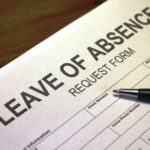 By Jim Cline and Erica Shelley Nelson
By Jim Cline and Erica Shelley Nelson
Representing the Injured or Disabled Member
Part 24: Leave Exhaustion as Just Cause for Separation
This article is the 24th in a multiple part series covering the rights your injured and disabled members have and how you, as a union or guild representative, can best assist them. Over the several weeks and continuing for the next several weeks, we’ll be publishing, in various segments, information on how state and federal laws protect your members who are hurt or otherwise unable to work. We’ll cover topics including disability discrimination law, the FMLA, job protection rights under the CBA, workers compensation, disability benefits, and the right to bring a civil lawsuit.
The topics we are covering are addressed in detail in our newest book: HELPING THE INJURED OR DISABLED MEMBER: A GUIDEBOOK FOR THE WASHINGTON LAW ENFORCEMENT AND FIRE UNION REPRESENTATIVE. It is also our intention over the course of the next year to travel through the state and provide training to public safety union and guild representatives on how best to enforce these rights. Expect to hear more on that in the months ahead.
The 24th article in these newsletter series provides a discussion concerning whether just cause exists under the CBA when an employee has exhausted their leave. For more information, visit our Premium Website . On the website you’ll find an on line version of the Injured or Disabled Member’s Guidebook and other information on the laws covering your members.
The question surrounding the exhaustion or nonexhaustion of FMLA leave (discussed later in this series) and contractual leaves (sick leave, annual leave, and other paid leaves) appears as a frequent source of confusion concerning separation from employment. The confusion reigns often on both sides.
Some employers believe that once the FMLA or contract leave is exhausted, just cause for separation exists. But that is not the law. Disability laws may require leave as an accommodation and the extent of that leave may exceed the time allowed under either the FMLA or under remaining contract leave balances. There is no inherent conflict here. What employers need to understand is that even when these leave balances are exhausted, employees may have a right, dependent upon the circumstances, to continue on unpaid leave.
On the other hand, unions or their members also frequently misunderstand the obligation of an employer to continue on payroll a clearly disqualified an employee. The often asserted claim by unions or their members is that the employer must allow the employee to discharge all paid leaves before termination. But that is not the law either. If an employee has no reasonable prospect of ever returning, an employer may have just cause to terminate even if paid leave time remains on the books. The employer is obligated to afford the employee due process to ascertain that there is not a reasonable prospect for return, but once that duty has been discharged, the employer is allowed to terminate and the existing leave banks would be liquidated according to the terms of the CBA.



